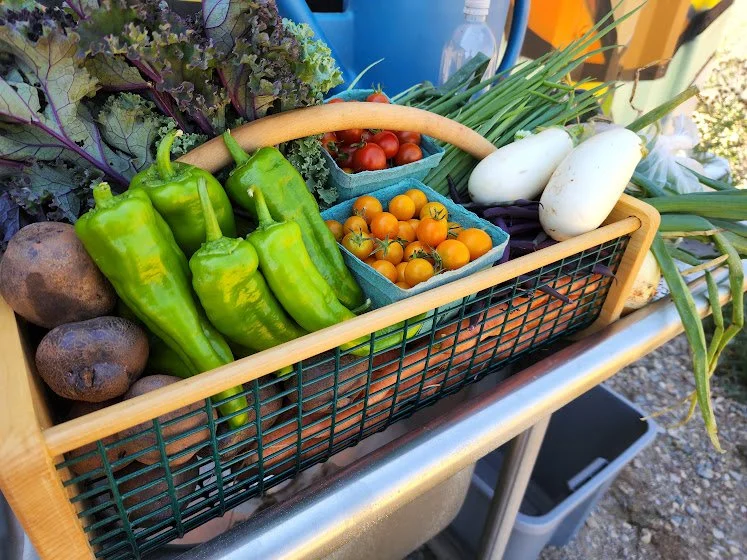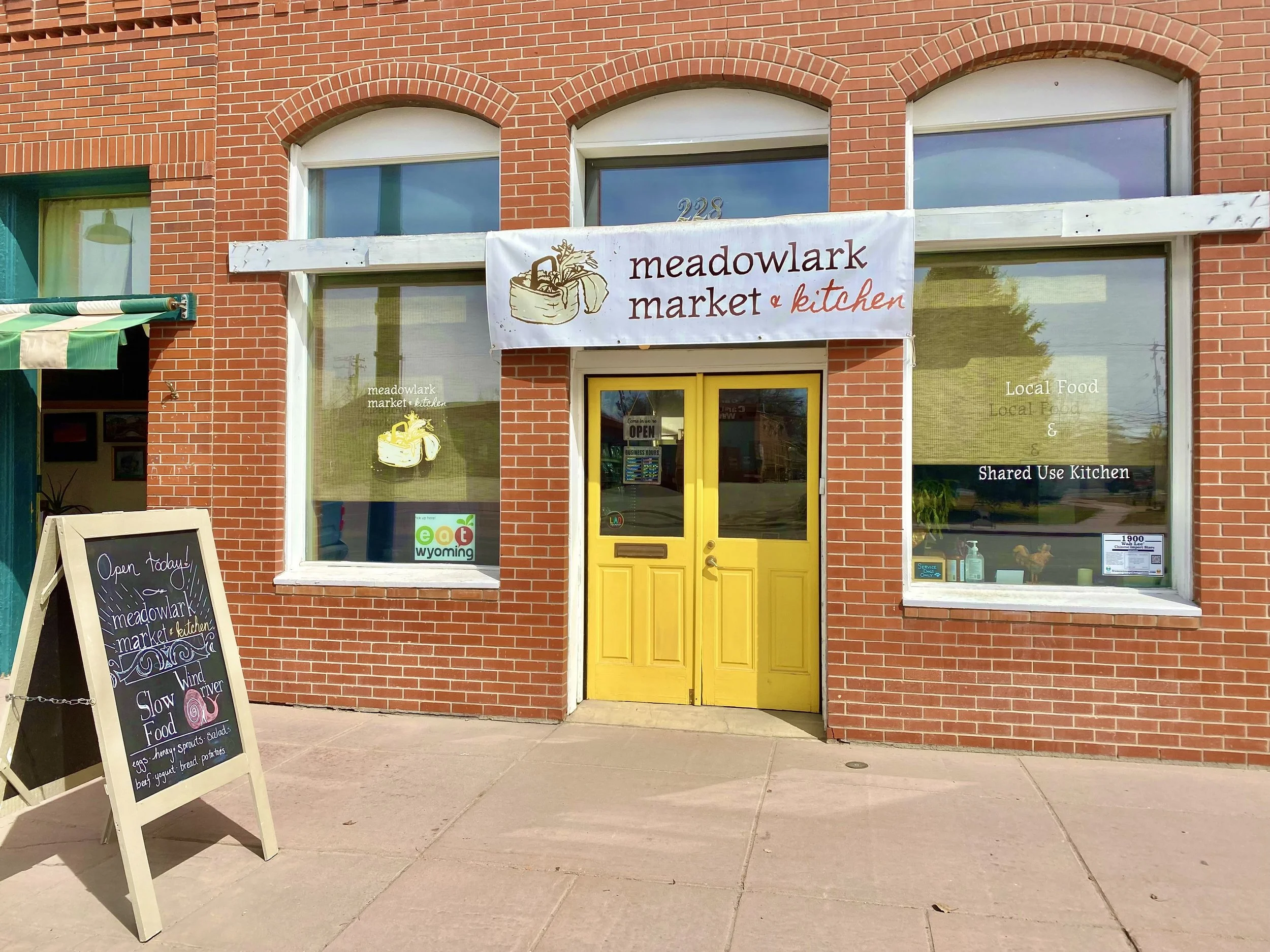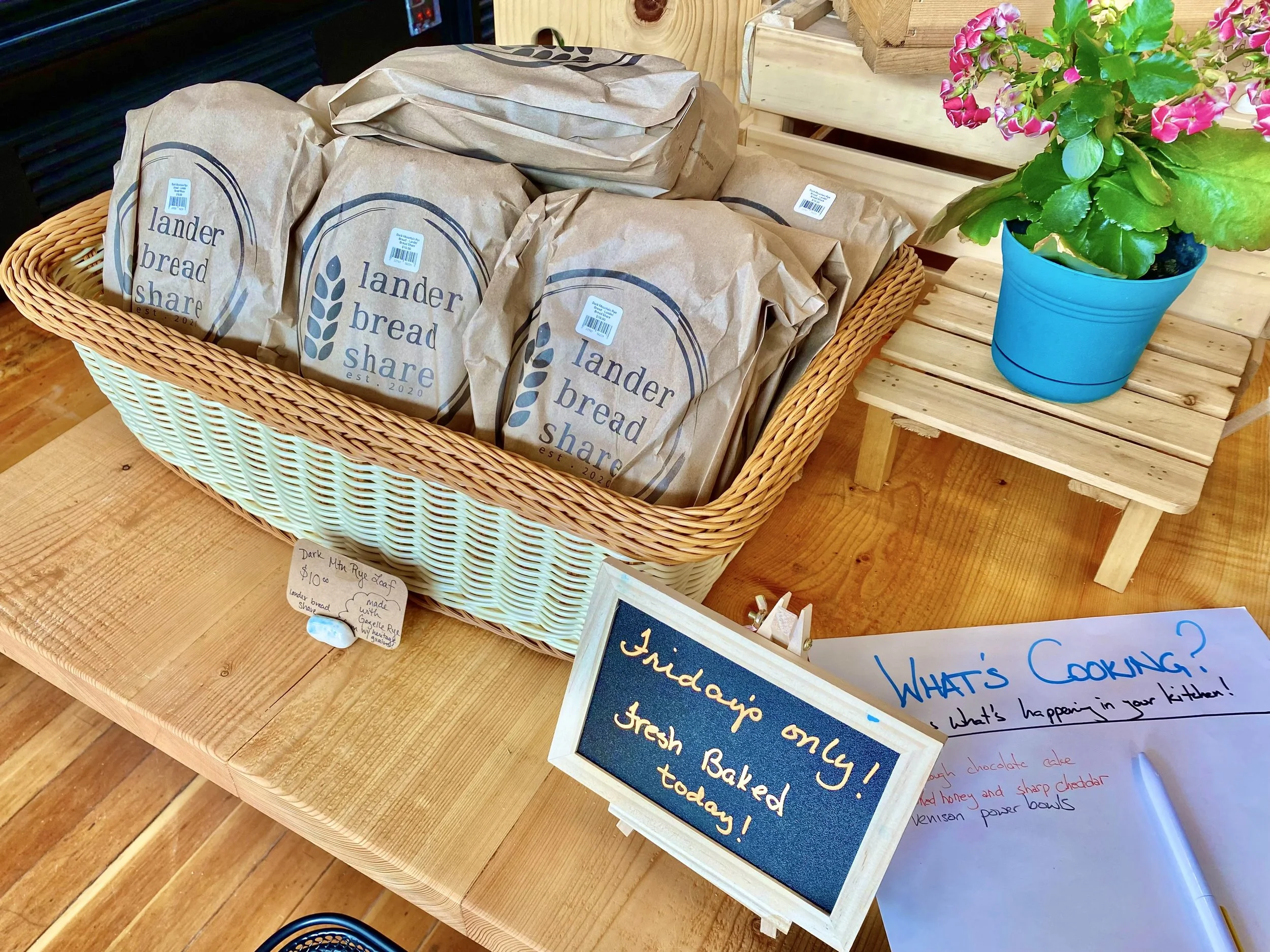The Return of the Local Marketplace
Fremont County’s Local Food Movement
Lander and Riverton, Wyoming
Written by Melanie Limpus
Photography by Melanie Limpus & Contributed by Meadowlark Market & Kitchen, Fremont Local Market, & Central Wyoming College
While some consider the Wyoming outdoor lifestyle to be based on recreation, sports, or even adrenaline, there’s more to it than that.
Agriculture is a way of life in Wyoming and is deeply rooted in the Cowboy State’s culture. It’s also one of the top three industries, along with tourism and minerals. There are about 10,500 farms across the state, which add up to nearly 30 million acres of agricultural land.
Most consumers are advocates and supporters of farmers and ranchers, and there is a huge desire for both to be able to close the gap on availability of farm to table choices throughout the year.
“The local food movement has intersected with regenerative, healthy, small-scale agriculture. It’s all about healthier food, healthier environment, and more money for local farmers and ranchers. It all comes together in a really cool way.”
Steve Doyle and his family operate a 200-acre farm, Red Roof Meat Company, in Riverton and found the entire selling process to be very difficult.
“So many little farms are operating in the negatives. If we could repopulate all of these small farms in our community, it would be tremendous!” Steve said.
Steve turned to the Wyoming Legislature to seek help, and the communities stood with him in support. With the advocacy of Central Wyoming College and numerous local farmers and ranchers that reached out, the representatives listened.
In 2015, the Wyoming Food Freedom Act passed, allowing for the sale and consumption of homemade foods without adhering to state regulatory and licensing requirements. Wyoming was the first state to enact a comprehensive Food Freedom Act, followed by North Dakota, Utah, and Maine. Thanks to Wyoming, more and more states are allowing an increasing variety of homemade foods to be sold.
Central Wyoming College has been instrumental in playing a leadership role among the communities to develop the system to make sure the local markets thrive.
“The Food Freedom Act made Wyoming this really unique place where you can buy products like unpasteurized milk, have local food markets, and sell directly to consumers. Every year we’ve worked with the legislature and opened it up a little bit more,” said CWC President Dr. Brad Tyndall.
Food freedom laws promote more markets and consumer choice, as well as provide opportunities for farmers and entrepreneurs. The newest amendment expands the Wyoming Food Freedom Act to allow a “designated agent” to facilitate sales transactions. That’s where Fremont Local Market in Riverton and Meadowlark Market & Kitchen in Lander come into play.
When the “designated agent” amendment passed, Steve finally had the ability to begin a brick-and-mortar market and Fremont Local Market opened in October of 2022.
Located on Riverton’s Main Street, Fremont Local Market currently hosts about 95 vendors, all producers of local goods from around the area. The store offers a variety of products including produce, dairy, eggs, and meat. The shelves are packed with artisanal items from scones and cookies to freeze-dried goods, dips, dressings, and salsas. The market even supplies homemade candles, lotions, soaps, aprons, and jewelry.
“We’ve been blown away by the amount of community support. We’ve got regulars and tons of people that come here to buy products before even thinking about going to the grocery store,” said Steve’s daughter, Morgan Doyle, who is the market manager.
Steve is thrilled to have other Wyoming counties and communities reaching out to ask for guidance with developing their own food freedom stores. Recently, Jack Schmidt, another member of the market, and Steve teamed up with Brad Tyndall to plan a fundraiser at the Doyle farm in support of local food, representing the “flavor” of the college’s regenerative and local agriculture.
“The local food movement has intersected with regenerative, healthy, small-scale agriculture,” Brad said. “It’s all about healthier food, healthier environment, and more money for local farmers and ranchers. It all comes together in a really cool way.”
In the town of Lander, a similar market opened on Main Street, in March of this year. In a 100-year-old-plus brick building, Meadowlark Market & Kitchen attractively displayed bundles of fresh sprouts, lettuces, and herbs invite shoppers to take a closer look. Inside, shoppers are met with the aroma of freshly baked breads. Shelves and coolers are stocked with eggs, honey, jams, and cheeses. A variety of locally raised cuts of beef, lamb, pork, chicken, and turkey offer creative opportunities for delicious meals.
Like Fremont Local Market, Meadowlark Market & Kitchen serves as a “designated agent” to help promote Wyoming producers and get their products to market.
Meadowlark is a project of Slow Food Wind River, the Lander-based nonprofit. Slow Food is a play on words – the antonym of fast food. The Slow Food Movement focuses on nourishment, taking pleasure in the diversity of recipes and flavors, recognizing how food is produced, and respecting the rhythm of seasons and human gatherings.
A collaboration of passionate and diverse locals consisting of ranchers, chefs, and nutritionists make up the board of the Slow Food Wind River (SFWR). They established SFWR to build a resilient local food economy that financially sustains farmers, ranchers, and value-added food processors to provide fresh, nutritious, locally grown foods to the community.
The brand new shared-use industrial certified kitchen is a major highlight of Meadowlark. The kitchen is available for people to rent for an hour, a day, or even an event. The tables in the center of the market display products during hours of operation but can also be converted into dining room tables for events and seat up to 26 people.
“We want to be this pop-up location for rotating chefs and caterers while also giving people a place to grow their businesses,” said Linda Williamson of SFWR. “It's been really amazing going through this process and discovering how many producers are out there. We hope this place can be a springboard for people to become food entrepreneurs.”
Entrepreneurship, supporting small businesses and farmers, and stimulating the local economy are the shared driving forces of the local food movement throughout Fremont County.
Ag economics is Dr. Brad Tyndall’s specialty and stimulating agricultural business and the local food economy is a big goal of CWC.
“Several years ago, CWC did a study to assess the local ag market,” Brad stated, “and that study made me realize CWC needs to play a big leadership role among the communities to develop the system and ensure these local markets could thrive. We’re working towards filling out our main streets and creating a lot more jobs.”
“Our job is to really nurture the food system and boost new businesses across the region. When you see a win like Fremont County having not only one, but two local food markets, it’s kind of miraculous.”
On CWC’s campuses, the Rustler Complex includes meat processing and packaging operations along with hands-on learning for all things agriculture. In Lander, the Alpine Science Institute is the state’s only farm incubator, a program designed to help beginning farmers expand their home garden into a farm business. The college also works to help partners acquire different grants, provide letters of support to applicants, and even transport food with trucks and cold storage freezers.
“Ag is cool. It’s heritage. It’s culture. It’s craft meat and gourmet vegetables. You lean into that cowboy culture and local beef and it’s thriving in our community,” Brad said. “Now we’ve got Fremont Local Food in Riverton, Meadowlark in Lander, and it’s working. More and more people are doing direct sales to consumers, and it’s really thrilling to be in Fremont County where we’re taking the lead nationally in agriculture and local food.”
CWC also works with partners such as Eat Wyoming, Wyoming's Online Farmers Market, which allows consumers to purchase local products online and have them delivered to their house or to another local food market to pick up. Both Meadowlark Market & Kitchen and Fremont Local Market are pick up locations for Eat Wyoming.
Brad concluded, “Our job is to really nurture the food system and boost new businesses across the region. When you see a win like Fremont County having not only one, but two local food markets, it’s kind of miraculous. Everything is local–everything–the wheat, the eggs, the milk… holy cow, it’s really special.”









